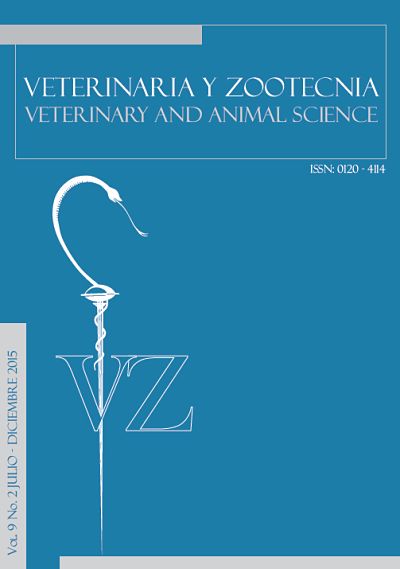Autores/as
Resumen
Con el uso de los probióticos se busca un efecto modulador sobre la microbiota del tracto gastrointestinal del pollo de engorde y los efectos benéficos a los que esto conlleva en el huesped. Objetivo: Evaluar un preparado de bacterias probióticas en el rendimiento de pollos de engorde en condiciones de crianza comercial. Materiales y Métodos: se usaron 42.848 pollos Cobb-500® de un día de edad, de ambos sexos. Los tratamientos se distribuyeron en un diseño en bloques completos al azar, en un modelo factorial 2x2, dos sexos y dos niveles de probiótico (con aditivo probiótico, 1kg/tonelada, y sin probiótico en el alimento), con cuatro repeticiones por tratamiento y 2.678 aves por unidad experimental. Las aves consumieron alimento y agua ad libitumdurante todo el período experimental. Resultados: La ganancia de peso, el consumo de alimento, la conversión alimenticia y la mortalidad no fueron afectados por la adición del probiótico en la dieta; mientras que, hubo efecto (P<0,01) del sexo sobre las variables peso corporal, ganancia de peso y consumo de alimento. Conclusiones: Con los resultados de esta nvestigación no fue posible demostrar diferencias entre los índices de rendimiento de los pollos alimentados con la mezcla de bacterias probióticas en la dieta, bajo condiciones de cría comerciales, y los de aquellos que no la consumieron.
Palabras clave
Citas
Bielecka, M.; Biedrzycka, E.; Majkowska, A. Selection of probiotics and prebiotics for synbiotics and confirmation of their in vivo effectiveness. Food Research International, v.35 (2/3), p.125-131, 2002.
Calder P.C.; Kew S. The immune system: a target for functional foods? Journal Nutrition, v.88, p.S165-S176, 2002.
Castillo, N.A.; De Moreno de LeBlanc, A; Maldonado Galdeano, C.; Perdigón, G. Probiotics: An alternative strategy for combating salmonellosis Immune mechanisms involved. Food research international, v.45, p.831-841, 2012.
Franz, C.M.A.P.; Huch, M.; Abriouel, H.; Holzapfel, W.; Gálvez, A. Enterococci as probiotics and their implications in food safety. International Journal of food Microbiology, v.151, p.125-140, 2011.
Gaggia, F.; Mattarelli, P.; Biavati, B. Probiotics and prebiotics in animal feeding for safe food production. International Journal of Food Microbiology, v.141, p.S15-S28, 2010.
Giannenas, I.; Papadopoulos, E.; Tsalie, E.; Triantafillou, E.l.; Henikl, S.; Teichmann, K.; Tontis, D. Assessment of dietary supplementation with probiotics on performance, intestinal morphology and microflora of chickens infected withEimeria tenella. Veterinary Parasitology, v.188, p.31-40, 2012.
Gibson, G.R.; Roberfroid, M.B. Dietary modulation of the human colonic microbiota: introducing the concept of prebiotics. Journal Nutrition, v.125, p.1401-1412, 1995.
Guarner, F.; Malagelada, J.R. Gut flora in health and disease. The Lancet, v.360, p.512-518, 2003.
Huang, M.K.; Choi, Y.J.; Houde, R.; Lee, B.; Zhao, X. Effects of Lactobacilli and an Acidophilic Fungus on the Production Performance and Immune Responses in Broiler Chickens. Poultry Science, v.83, p.788–795, 2004.
Jelen, P.; Lutz, S. Functional milk and dairy products. In: Mazza, G. (Ed). Functional foods: biochemical and processing aspects. Lancaster: Technomic Publishing, 1998. p.357-381.
Jin, L.Z.; Ho, Y.W.; Abdullah, N.; Jalaludin, S. Growth Performance, Intestinal Microbial Populations, and Serum Cholesterol of Broilers Fed Diets Containing Lactobacillus Cultures. Poultry Science, v.77(9), p.1259–1265, 1998.
Jung, S.J.; Houde, R.; Baurhoo, B.; Zhao, X.; Lee, B.H. Effects of GalactoOligosaccharides and a Bifidobacteria lactis-Based of Probiotic strain on the growth performance and fecal microflora of Broiler Chickens. Poultry Science, v.87, p.1694- 1699, 2008.
Klaenhammer, T.R. Probiotics and prebiotics. In: Doyle, M.P; Beuchat, L.R.; Montville, T.J. Food microbiology: fundamentals and frontiers. 2.ed, Washington D.C. American Society for Microbiology, 2001. p.797-811.
Kopp-Hoolihan, L. Prophylactic and therapeutic uses of probiotics: a review.Journal of the American Dietetic Association, v.101, p.229-241, 2001.
Mountzouris, K.C.; Tsitrsikos, P.; Palamidi, I.; Arvaniti, A.; Mohnl, M.; Schatzmayr, G.; Fegeros, K. Effects of probiotic inclusion levels in broiler nutrition on growth performance, nutrient digestibility, plasma immunoglobulins, and cecal microflora composition. Poultry Science, v.89(1), p.58–67, 2010.
Nakphaichit, M.; Thanomwongwattana, S.; Phraephaisarn, C.; Sakamoto, N.; Keawsompong, S.; Nakayama, J.; Nitisinprasert, S. The effect of includingLactobacillus reuteri KUB-AC5 during post-hatch feeding on the growth and ileum microbiota of broiler chickens. Poultry Science, v.90, p.2753–2765, 2011.
National Research Council. Nutrient Requirements of Poultry 9.ed, Washington, DC: National Academy Press, 1994.
Pump, A.; Nemcová, R.; Mudronová, D.; Guba, P. The possibilities of potentiating the efficacy of probiotics. Trends in Food Science & Technology, v.13, p.121–126, 2002.
Sharifi, S.D.; Dibamehr, A.; Baurhoo, H.; Lotfollahian, B. Effects of flavomycin and probiotic supplementation to diets containing different sources of fat on growth performance, intestinal morphology, apparent metabolizable energy, and fat digestibility in broiler chickens. Poultry Science, v.91, p.918–927, 2012.
Singh, K.; Kallali, B.; Kumar, A.; Thaker, V. Probiotics: A review. Asian Pacific Journal of Tropical Biomedicine, p.S87-S90, 2011.
Stata Version 12.0. College Station, Texas, USA, Serial License 30120546473.
Van de Water, J. Yogurt and immunity: the health benefits of fermented milk products that contain lactic acid bacteria. In: Farnworth, E.R. (Ed). Handbook of fermented functional foods. 2003. p.113-144.
Ziemer, C.J.; Gibson, G.R. An overview of probiotics, prebiotics and synbiotics in the functional food concept: perspectives and future strategies. International Dairy Journal, v.8, p.473-479, 1998.

 pdf
pdf
 FLIP
FLIP














